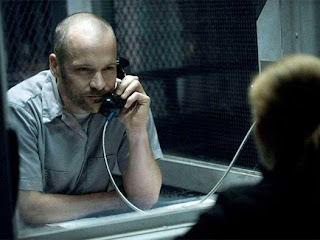Two Takes on Violent Men
"What I suggest is you go to an execution, and see a man be killed. You watch him die, and you watch him beg!" — Ellen Roark, "A Time to Kill"
Sunday has long been a big night for premium cable fare, and this summer is no exception. The final season of "Dexter" is nearing its mid-point, and the third season of "The Killing" is nearing its end. While "Dexter" has long been a popular cable drama, what's more surprising has been "The Killing." After two mediocre seasons, the show was cancelled. Then, when AMC had a hole in its schedule, the show was uncanceled.
The producers of "The Killing" have used that late game save to re-boot the show creatively. The core of what worked — Linden (Mireille Enos) and Holder (Joel Kinnaman) — remained, and the rest changed. And it's been a superb season, delivering on the promise once contained in the show's pilot. It's also been a season of tackling big issues.
First, "The Killing" set its crime in the world of teenage runaways. The sad commentary on so many youths who are lost in this country was inescapable. It also allowed for some great work from the leads as they encountered these teens, their struggles, and had to consider that.
Last night, in the penultimate episode of the season, the show looked at the justice system — in particular the death penalty. It was a beautiful, moving, and haunting hour, thanks in large part to the work of Peter Sarsgaard as Ray Seward. The show also set up a contrast nicely with "Dexter," another show about cops and criminals that is wrapping up its run.
This season "Dexter" has challenged the notion of morality and necessary evil. Dexter Morgan (Michael C. Hall), a serial killer with a code, has been re-defined as a just and necessary element of our society. He commits dark deeds, but they are in the service of a greater good. His work of eliminating bad men is necessary for our world to continue. His own misdeeds are simply the cost of doing business. It's a dark view of the world.
On "The Killing," the idea offered is that we all pay for our misdeeds. Ray Seward was convicted of a murder he didn't commit. He languished on death row and, ultimately, (spoiler alert) was executed for that crime. Though he didn't murder his wife, last night's episode made abundantly clear that he was far from innocent. It didn't ask you to shed a tear for Ray Seward and the life he was denied, though it would be hard not to do so by hour's end. Instead, it noted that we all pay for the evil we've done.
The episode did, however, make you consider the death penalty. "The Killing" is far from the first show to ask these hard questions. "A Time to Kill" offers debate about the death penalty, and so does "Dead Man Walking."
The film "The Life of David Gale" was meant to be a political argument against the death penalty as a man innocent of the crime for which he's been convicted is put to death. The part that doesn't work for me is that the man worked the system to ensure he was put to death to prove a point about the system being flawed. It was a flawed argument to make, in that case.
"The Killing" offered something different. In principal it's easy to agree with the death penalty. It's hard to disagree that the world is a better place without some of the dark men and dark deeds we've seen in this world. But to agree with the death penalty as practiced in this country, you have to have faith in our system of justice. That, for me, is where the argument breaks down.
I used to be an ardent supporter of the death penalty. But as I've grown older and seen the flaws in our government and in our justice system, that view has changed. I understand the principal, but I lack confidence in the administration of justice in this country.
We don't weep for a man like Ray Seward because he's innocent. The show doesn't ask you to see him as a victim, just as collateral damage in a fatally flawed system. Good art forces you to consider your world, your views of the world, and leads you to invest in those stories. For the first time in three seasons, "The Killing" has risen to the level of good art.




Comments
Post a Comment